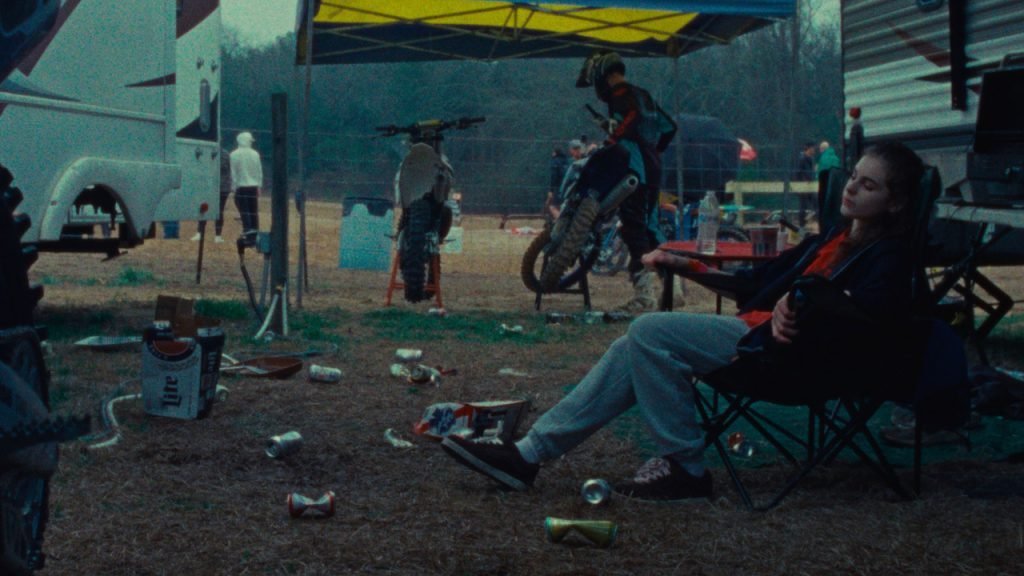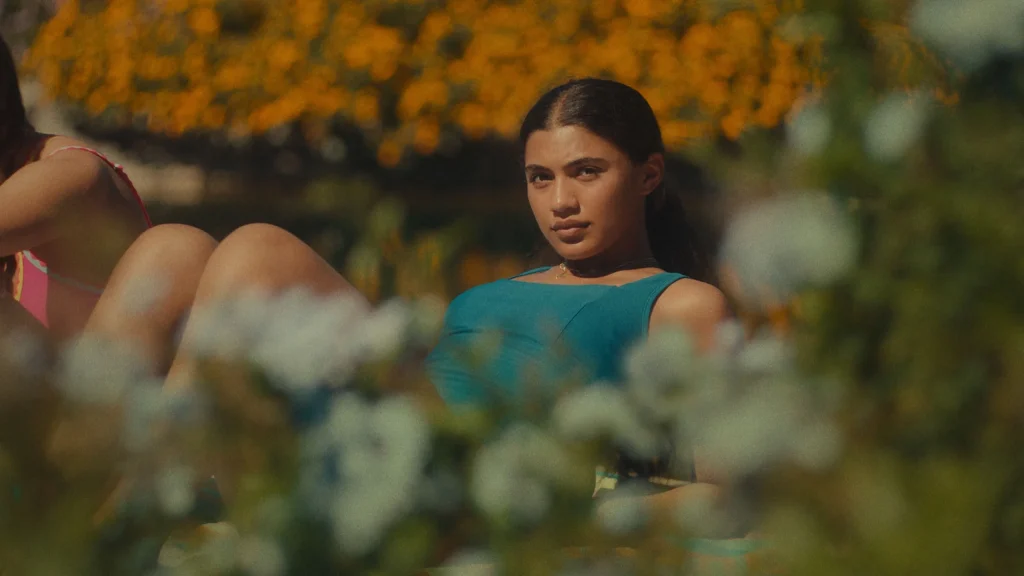I’ve been extraordinarily lucky to have been able to attend Sundance Film Festival in person three times—all during my university years, supported by funding. Coincidentally, the very last of those visits was in January 2020, immediately before the pandemic. Since then, I’ve seen the festival through virtual eyes, including the eventual 2023 closure of Sundance’s New Frontier programme dedicated to more experimental and transmedia works—and the festival’s odd but still welcome avatar-based digital space that popped up as a response to a remote festival. One year, with online access, I even watched the entirety of Sundance’s shorts programming which at the time consisted of over 100 films (not a venture I would attempt again, for a variety of reasons). But this year, my perspective specifically goes queer: what shorts are out there that really captivate and push boundaries?
In this report, I’ve thus picked five queer(ed) as you will see—shorts that stood out to me in some way: having some level of creative quality, yes, but also for trying something exciting in their storytelling. All of them just so happened to be live-action, but only on coincidence; there were several intriguing animated shorts, but they didn’t stick with me so rigorously. To note, all of these films were also labelled by the festival under their tag of “LGBTQ+ Stories”, even though I would also not necessarily include one or some of these on first glance. This is why I have also included the descriptor “queered”, which in this case pertains to the nature of the experiences depicted. As goes a Twitter joke that emerged during the pandemic, “every bird inside an airport is queering a space”, we, too, are looking at films in which their relationships or dynamics are queered.
Are You Scared to Be Yourself Because You Think That You Might Fail? (2024) by Canadian American writer-director Bec Pecaut boasts a lengthy title with a much less lengthy objective. In true festival fashion, it stars Sundance favourite Lío Mehiel, who became the first out trans actor to with the Sundance Dramatic Special Jury Award for Mutt (2023 Sundance) and also starred in the 2024 Sundance US Dramatic Grand Jury Prize film, In the Summers. The film intimately depicts a trans person, Mad (Mehiel), in the immediate days after their gender-affirming surgery, feeling unable to remove their bandages or feel completely independent. The protagonist is supported by their partner Kat (Sadie Scott) and mother (Phyllis Ellis), who is just doing her best to not be too in-the-way.
As the nonbinary director’s second short, Are You Scared took home the Short Cuts Award for Best Canadian Film at the 2024 Toronto International Film Festival. And understandably so: Pecaut brings to us an angle that we hardly see on screen in a humorous, everyday way. Like the intense strain as depicted by Victoria Verseau of her gender-affirming bottom surgery in Trans Memoria, where viewers are privy to the continuous hardship and pain in the time immediately after, Pecaut depicts what we don’t see of top surgery and all that isn’t simply the euphoric aspect. We are witness to Mad’s peculiar sense of loss—a sort of dysphoria turned on its head, where the desired absence of breasts triggers a disconnect in the days after—and how those around them want to help but simultaneously don’t want to overstep. Its dialogue is, at times, a bit explanatory, while we see too little of Mad’s relationship with their mother until the end, even though it is foundational to the story. However, Are You Scared quickly turns into an imperfect, sometimes too on-the-nose short that is still generous, uplifting, and motivational.

‘Ragamuffin’ by Kaitlyn Mikayla
Even though they are very different works, Ragamuffin is a thematic reminder of Sander Joon’s delightful animated Estonian short Sierra, which also examines the relationship between a child and their father within the context of competitive motorsports racing. Ryan has a weighty double standard has been placed on her, also as a motocross competito: she’s expected to fail at the sport because she’s a girl, but she’s simultaneously expected to be perfect and attentive at all times when it comes to helping the other athletes with their vehicles and equipment needs. However, the young protagonist’s attraction to the older teen girls and young women who float in and out of the lives of the sleazy men in the motocross world puts her in an unprecedented position as the one to break the heteropatriarchal mold, although the nature of this attraction is left up to interpretation. The filmmaker tries to incorporate the aspect of Ryan’s deafness into the story, which feels like one layer too much in the already topically brimming story. However, we experience it through a very interesting aural landscape of sound design by Victor Chavez, such as when Ryan clicks on or off her hearing aids when she’s concentrating or looking to tune out her obnoxious surroundings.
Chheangkea‘s Grandma Nai Who Played Favorites (2025, ចៅសំណព្វចិត្ត) enjoyed its world premiere and became the winner of the Short Film Jury Award for International Fiction with its playful magical realism and moving message. 29-year-old Meng (Bonrotanak Rith) must contend with his bickering family, who constantly pester him about getting married and having children. As Meng’s family members honour their ancestors during Qingming Festival (celebrated by members of the Chinese diaspora, often cleaning tombstones and laying out offerings for the deceased), his beloved grandma Nai (Saroeun Nay) returns as a spirit to gossip about the family with another spirit friend. Despite the film’s heavier undertones, the filmmaker also cultivates a cheeky and fun quality to the film, such as through the costume picks for Nai—floral prints are all the rage—and her youthfulness and spritely behaviour.
As viewers, we slowly learn about Meng’s sexuality via context clues, which Chheangkea accomplishes effectively through dialogue and the performance of Rith. After watching Meng cave to the family’s pressure to marry a young woman named Pech (Sokun Theary Ty), Nai directly intervenes during a karaoke night between the two families, acutely aware of her grandson’s queerness as she witnesses her grandson’s immediate attentiveness toward Pech’s brother (Ponleu Chab). Chheangkea effectively employs a series of subtle visual choices to emphasise the awkwardness between Meng and Pech, including a static camera that heightens every one of their moves. Although Grandma Nai Who Plays Favorites still falls prey to an abrupt ending and the feeling of somewhat underdeveloped character relationships—despite its cheerful close, the unique world-building cements the Cambodian filmmaker’s vision regardless.



Last but not least, two quirky shorts from the US played with power dynamics and the queering of relationships between women: Azi (2024) by Persian American filmmaker Montana Mann and Goodnight (2025) by Isabel Pask, the latter of which also world-premiered at Sundance. In the former, the titular 17-year-old teen (Dior Goodjohn) goes on a trip with her friend Morgan (Emma Filley), her friend’s father Ben (Dan Thiel), and his new girlfriend Elizabeth (Breeda Wool). Azi and Elizabeth then become entangled in an off-putting game of chicken and social dominance as they each vie for the attention of the others. Mann creatively uses a telephoto lens and elements of distance to frame her subjects, creating the feeling of voyeurism and alertness at all times. By the end of the film, viewers are left wanting more of this intriguing dynamic between the teen and the slightly older woman, but this truncation of concept is not uncommon through many shorts.
Goodnight similarly plays with the psycho-intellectual dynamics between two female characters. This two-hander between a hospice nurse Daria (Dagmara Dominczyk) and a young woman, Max (Annie Fox), who takes care of her at home quickly evolves into what seems to be an oddball roleplaying game. It never fully turns perverse—the traditional caretaker turns into the cared-for —unlike a film like Fleur Fortuné‘s The Assessment (2024) and instead remains in the territory of “maybe weird” and “maybe wholesome”. As Daria descends into childlike behaviour, Max takes over as what is more or less an adult babysitter. The short, however, is strictly exploratory over the course of one evening, and we unfortunately gain no additional information about the relationship between Max and Daria outside of the game, or the strenuousness of Daria’s job, for instance. As a result, both Goodnight and Azi both feel more like proofs-of-concept for a feature rather than a standalone short (as a matter of fact, Mann is already developing her short into a feature). However, they stand on the uniqueness of their ideas and the sort of psychosexual power that lies behind power dynamics, age gaps, and consenting twists of the knife.





